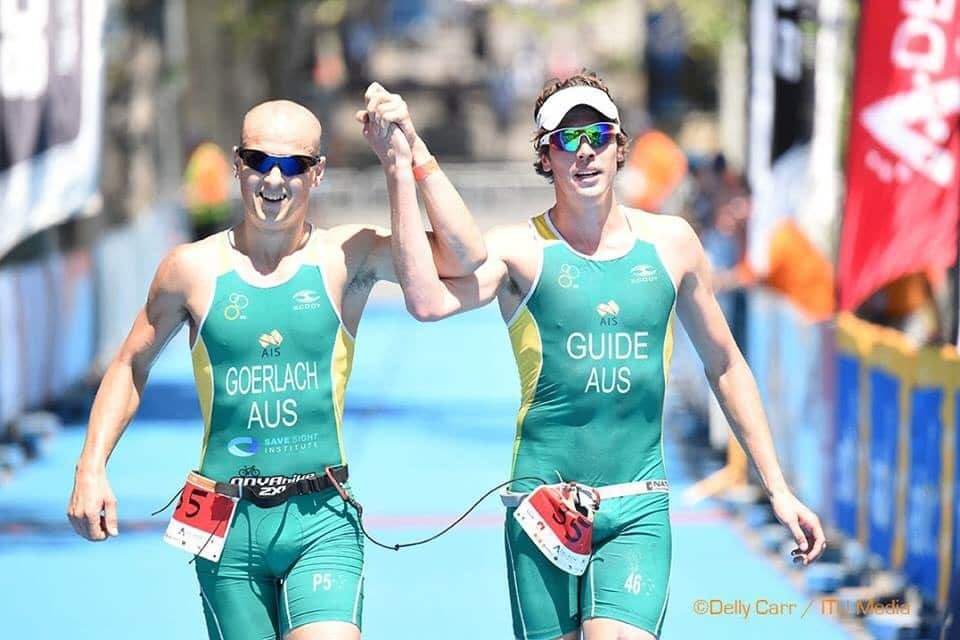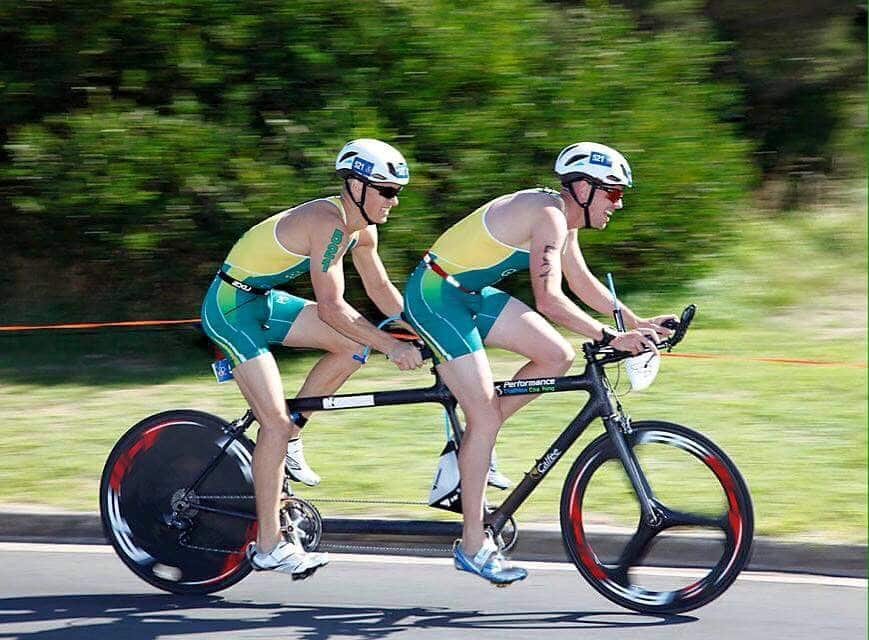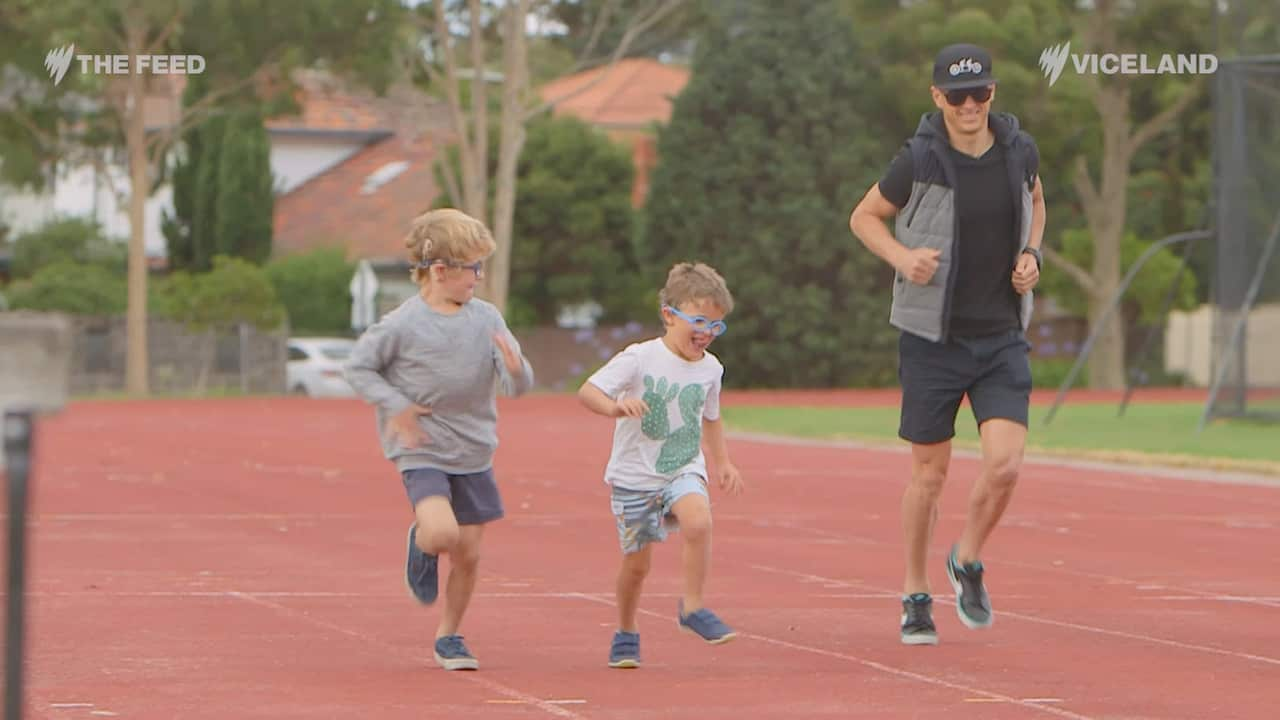Triathlon is one of the most gruelling Olympic events – so if ever there were a class of superhumans, surely Paralympic triathletes are it.
Meet Jonathan Goerlach: “I have Type 2 Usher Syndrome, which means I have about five to six degrees of peripheral vision, and it affects my hearing. And, yeah, I do paratriathlon, which is triathlon for people with disabilities.”
Jonathan’s vision has been deteriorating since he was in high school.  Reflecting on his childhood in Nowra, a small coastal town in NSW, Jonathan says, “Growing up, my family probably helped too much, which maybe restricted me from doing things that I wanted to do because they wanted to keep me safe.”
Reflecting on his childhood in Nowra, a small coastal town in NSW, Jonathan says, “Growing up, my family probably helped too much, which maybe restricted me from doing things that I wanted to do because they wanted to keep me safe.”

Jonathan, left, tethered to his guide. Source: Supplied
“I think it's tougher on the family than it is on the individual. Their natural instinct is to help when they see someone whp they care about dealing with something like that.”
Feeling like his world was getting smaller as he got older, Jonathan felt an urge to break free – so he packed up and shipped out to Amsterdam, where he soon found work as a Remedial and Sports Massage therapist. It was a life changing move, and it gave him the confidence to aim higher.
So, in 2010, when the International Olympic Committee announced that paratriathlon would be an official sport at the Rio 2016 Games, for a man who’d struggled to see for most of his life, it was a moment of clarity: this was his calling.
At that time, Jonathon could barely swim a lap of a pool. But now he had a goal and six years to reach it.
Two years out from the Games, he was on track with multiple National and Oceania Championship wins under his belt. But while Jonathan was competing at the World Championships in Chicago, news broke that although triathlon would remain an event at Rio, his category – PT5 Visually-Impaired – would not be a medal event.
But while Jonathan was competing at the World Championships in Chicago, news broke that although triathlon would remain an event at Rio, his category – PT5 Visually-Impaired – would not be a medal event.

Jonathan, left, with his guide leading the way. Source: Supplied
Because his category was no longer in medal contention, he was no longer eligible to receive funding support from his national sporting organisation.
“It was a massive setback,” says Jonathan.
But he didn’t give up. He doubled down. Jonathan quit his job and focussed his sights beyond Rio 2016. When he wasn’t in the pool, on the bike or at the track, Jonathan was raising money to pursue his dream of Paralympic glory at the Tokyo 2020 Games. In September, he'll find out if his category will be in medal contention.
But there are other challengers on the road ahead for Jonathan, like finding a guide who can keep up.
When you’re one of the best paratriathletes in the world, it’s hard to find a guide who isn’t competing on the pro circuit, and is willing and able to travel the world as your guide.
Jonathan has managed to find guides, but covering all of his guides’ travel and accommodation expenses takes its toll. He even pays what his guides would otherwise earn if they can’t take paid leave from work.
Mentoring two young boys with Usher syndrome
Jonathan doesn’t want others who are growing up with Usher syndrome to feel like the future isn’t full of possibilities. That’s why he’s mentoring Harry and Louis, who are both likely to be blind before they finish school.
“If I can have some sort of influence on them to have a more positive outlook on life and set a good example in a way, that would be great. Jonathan was introduced to Harry and Louis when the boys’ mums, Hollie and Emily, set up Usher Kids Australia, an organisation that connects families living with Usher syndrome.
Jonathan was introduced to Harry and Louis when the boys’ mums, Hollie and Emily, set up Usher Kids Australia, an organisation that connects families living with Usher syndrome.

Louis and Harry with their mentor, Jonathan. Watch their story in the video above. Source: SBS
“Before Emily and Holly came along, there was no real community there, there was no support group, there was no one who understood what it was like to go blind and be hearing impaired.”
Having someone to look up to is something Jonathan wishes he had when he was growing up.
“The only limitations you're going to have are the ones that you place on yourself, not the ones that people put on you."
Share
Through award winning storytelling, The Feed continues to break new ground with its compelling mix of current affairs, comedy, profiles and investigations. See Different. Know Better. Laugh Harder. Read more about The Feed
Have a story or comment? Contact Us

